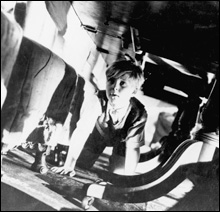
BOY’S EYE VIEW: Savor the psychological tale, not the tedious whodunit.
|
It’s easy for me to say, because I don’t have to put butts into seats, but wouldn’t it be great if a local repertoire house programmed a series of adaptations of the late British novelist Graham Greene? What fun! Except for Patricia Highsmith (they were pen pals), he’s the most Hitchcockian of writers, a master of beautifully plotted espionage thrillers. His œuvre, matching Sir Alfred’s films, is steeped in dark, gothic, guilt-ridden Catholicism.In recent years, we’ve had Neil Jordan’s soggy, overrated version of The End of the Affair (1999), but also Philip Noyce’s bold, subversive The Quiet American (2002). Wouldn’t it be fascinating to pair these with the versions of the books from, respectively, 1955 and 1957? Everyone’s seen the masterpiece among Greene adaptations, The Third Man (1949), and This Gun for Hire (1942), with Alan Ladd and Veronica Lake, is an often-revived film noir. But how often does anyone get a stab at this trio of Graham Greenes made by reputable directors: Fritz Lang’s Ministry of Fear (1943), Carol Reed’s Our Man in Havana (1959), George Cukor’s Travels with My Aunt (1972)? How good is the British Brighton Rock (1947), with a script by the author? Or a 1961 CBS-TV The Power and the Glory starring Laurence Olivier as Greene’s blighted whisky priest? More choices from novels: The Confidential Agent (1945), The Man Within (1947), England Made Me (1972).
Convinced that Beantown could use a half-dozen Graham Greene thrillers? You might try as a sample the Kendall Square’s current revival, in a restored 35mm print, of Carol Reed’s The Fallen Idol (1948), with a script by Greene based on a short story. It’s a pretty good suspense tale, and its central concern — an amity threatened because of the secret, suspect life of the more-idolized friend — looks forward, a year later, to The Third Man. In the latter film, also a Reed (director) and Greene (screenwriter) collaboration, writer Holly Martin arrives in Vienna to learn that the pal he worshipped, Harry Lime, was involved in deadly drug dealing. In The Fallen Idol, a British boy adores his male manservant, but his adoration unravels as he sees his adult hero enmeshed in lies, adultery, and, perhaps, murder.
Phillipe (Bobby Henrey) is a floppy-haired, short-pants, Christopher Robin of a lad racing about a mammoth three-floor embassy. His marble-mouthed, ruling-class ambassador dad is often away; lonely Phillipe’s surrogate father is butler Baines (Ralph Richardson), who pays the boy kind attention while minding the store. But Baines is married to a brittle shrew (Sonia Dresdel), and she’s wicked-witch cold to Phillipe. Soon after the movie begins, Phillipe shows his allegiance when he promises not to reveal a secret he’s stumbled upon: Baines is hanging out with a young French woman (Michelle Morgan). The boy believes she’s Baines’s niece. We know better: he’s fallen desperately in love, and he desperately wants to leave his wife.
The Fallen Idol is at its best when it stays at a boy’s-eye view of this impossible love triangle. But at some point, a major character goes tumbling down some stairs, and the bobbies come around, and their queries turn a thrilling psychological tale into a tedious whodunit. Better than the investigative plot: Reed and Greene making the embassy a microcosm of the British class structure, with Phillipe and family at the top, Mr. and Mrs. Baines in the starchy, well-groomed middle, and several thick-waisted cockney charwomen, cigarettes dangling, roaming about at the bottom.